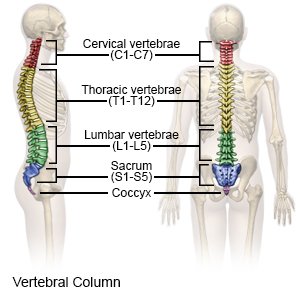Tethered Cord Syndrome in Children
Medically reviewed by Drugs.com. Last updated on Aug 4, 2025.
Tethered cord syndrome (TCS) means your child's spinal cord is pulled down and tied (tethered) within his or her spinal column. The spinal cord normally moves freely within the spinal column. As your child grows, the tethered cord stretches. This can cause permanent nerve damage.
 |
DISCHARGE INSTRUCTIONS:
Seek care immediately if:
- Your older child tells you he or she has severe pain.
- Your baby cries constantly and cannot be consoled.
- Your legs become so weak you cannot stand or walk.
Call your child's doctor if:
- Your child is becoming less able to move, crawl, or walk.
- Your child has new or worsening back or leg pain.
- Your child has new or worsening trouble urinating or having a bowel movement.
- You have questions or concerns about your child's condition or care.
Medicines:
- Prescription pain medicine may be given, depending on your child's age. Ask your child's healthcare provider how to give this medicine safely. Some prescription pain medicines contain acetaminophen. Do not give your child other medicines that contain acetaminophen without talking to a healthcare provider. Too much acetaminophen may cause liver damage. Prescription pain medicine may cause constipation. Ask your child's provider how to prevent or treat constipation.
- Do not give aspirin to children younger than 18 years. Your child could develop Reye syndrome if he or she has the flu or a fever and takes aspirin. Reye syndrome can cause life-threatening brain and liver damage. Check your child's medicine labels for aspirin or salicylates.
- Give your child's medicine as directed. Contact your child's healthcare provider if you think the medicine is not working as expected. Tell the provider if your child is allergic to any medicine. Keep a current list of the medicines, vitamins, and herbs your child takes. Include the amounts, and when, how, and why they are taken. Bring the list or the medicines in their containers to follow-up visits. Carry your child's medicine list with you in case of an emergency.
What you also need to know about TCS:
- Folic acid taken during pregnancy can help prevent neural tube defects that lead to TCS. The neural tube develops into the spinal cord, brain, and spinal column. The neural tube normally closes within the first month of pregnancy, possibly before you know you are pregnant. If you are planning to get pregnant or are pregnant, get 400 to 800 micrograms (mcg) each day. Your healthcare provider may tell you to take up to 4,000 mcg of folic acid if you already had a child with a neural tube defect. You will probably need to take a supplement to get enough folic acid. Start taking the supplements at least 1 month before you get pregnant, if possible. Continue through the first 3 months of pregnancy, or as directed.
- You may need to care for your child's bladder and bowels. TCS tends to get worse over time. Clean your baby's diaper area well to avoid infection or other health problems. Remind your older child to urinate or have bowel movements as soon as he or she feels the urge. You may also have to give your child an enema or stool softener so he can have regular bowel movements. This will help you predict and prepare for bowel movements.
Follow up with your child's doctor as directed:
Your child's spinal column will be checked over time to make sure it does not become tethered again. This is more likely to happen when your child is between 5 and 9 years old. Write down your questions so you remember to ask them during your visits.
© Copyright Merative 2025 Information is for End User's use only and may not be sold, redistributed or otherwise used for commercial purposes.
The above information is an educational aid only. It is not intended as medical advice for individual conditions or treatments. Talk to your doctor, nurse or pharmacist before following any medical regimen to see if it is safe and effective for you.
Further information
Always consult your healthcare provider to ensure the information displayed on this page applies to your personal circumstances.
